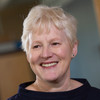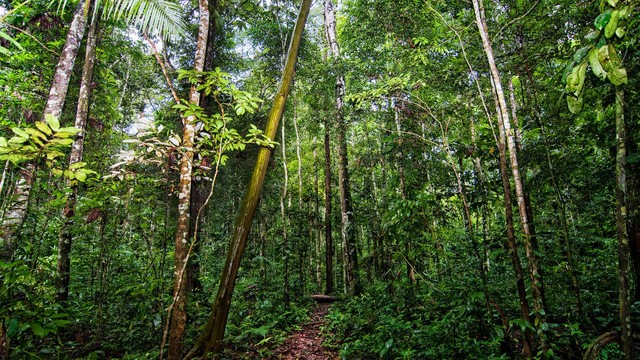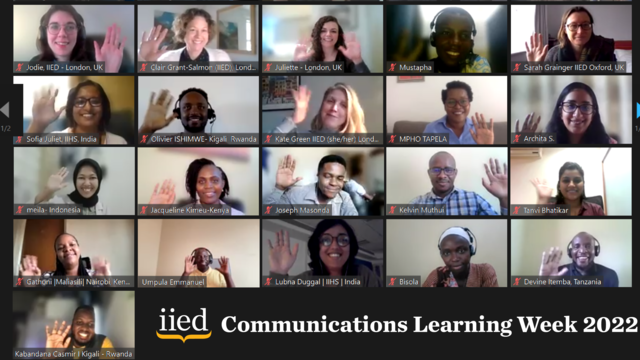Learning together boosts confidence and better communications
What is the long-term impact of Communications Learning Week – IIED's four-day workshop for people working on communications in the global South? Rosalind Goodrich had the opportunity to catch up with a 2018 participant and heard how it has impacted his work.


2018 participants, including Abisha Mapendembe (in the white shirt), working on creating audience profiles (Photo: Anne Schulthess, IIED)
IIED’s Communications Learning Week is always a great event: new people to meet, all kinds of knowledge and experience shared, and lots of learning opportunities for everyone.
The week brings staff responsible for communications from our partners in the global South to London for a four-day joint workshop with IIED’s Communications Group. We start with how to put a communications strategy together, move on to thinking about audiences in great depth, and then look at a variety of social media and digital outputs.
But after some busy days – and a couple of evenings – together, off go our partners back to their homes and work. It’s too soon! Conversations have just got going, there’s much more to discuss, but by the nature of the event – IIED Comms staff in London and participants around the world – there’s no option but to keep in touch virtually. That’s what we do most effectively through WhatsApp and a Comms Learning Week Alumni Facebook group.
Of course, nothing beats meeting face to face, so it was with great pleasure that I met up recently with Comms Learning Week participant Abisha Mapendembe, a programme officer for UNEP-WCMC, at a meeting in Durban, South Africa. Abisha joined us in 2018, and it appears from what he told me, that he was able to put into practice immediately what he had learnt in London.
“My work at UNEP-WCMC focuses on mainstreaming environment or biodiversity and development objectives into decision making and implementation processes at local, sector or national level,” he tells me. “I engage with local and national governments, to shape their plans and policies, investments and regulations, so really, it’s all about communications.”
He realised he enjoys communications activities, which is just as well, because he’s right, they are at the heart of his ‘mainstreaming’ work. “Comms is an essential skill for what I am doing,” he says. ”I need to develop simple, clear non-technical messages that can motivate the people we are engaging with to act on the issues we are raising. I’m talking to people in finance and economic ministries who don’t have a grasp of biodiversity issues.”
'Entry points create a fertile space to influence but are of short duration' Great to see alumnus of @IIED #Communications learning week @MrAbiMapendembe presenting on nature of opportunities & entry points for communication & engagement, #clw2019 #Connectbiodiversity @unepwcmc
— Rosalind Goodrich (@RosGoodrich) November 7, 2019
Abisha is of the view that to know how to craft messages and communicate them in different ways – blogs, articles, possibly a short video on social media – could change the way people think about the decisions they are making; could change their attitudes and behaviour, and in turn, change the outcomes of a project.
For him, communications is now an indispensable pillar of his work.
“There was such a rainbow of people at Communications Learning Week,” he says. He found out about the challenges for communication in Tanzania, Brazil and India, and the conversations in the evening over a meal or on a walk, were like extra sessions of the course itself.
I asked him what was his number one take away? He tells me it was what he learnt in the session on putting a communication and engagement strategy together. In fact, the session was so spot on that he was able to apply some of the learning to one of his work projects even before the week had ended.
And what about in the year that has ensued? Has he used any of the tactics learnt at Comms Learning Week? Absolutely!
Abisha has started co-teaching a masters course at the Université Félix Houphouet-Boigny in Ivory Coast, on using IPBES assessments to support the implementation of the Sustainable Development Goals in West Africa. It’s part of a MSc in Managing the Science-Policy Interface on Biodiversity and Ecosystem Services for Sustainable Development in West Africa (SPIBES), and is all about putting across messages that will resonate.
And he’s been involved in a project with the Global Biodiversity Information Facility, an international network providing open access to data on biodiversity. The ‘Biodiversity Information for Development’ project aims to connect biodiversity data to decision making, and is developing and delivering a mainstreaming module with a strong communications element.
He’s also devised a ‘dragons’ den’ exercise: hardcore biologists, scientists and data specialists have to work out how to put across important messages in a compelling but understandable way.
The IIED Communications Learning Week experience gave me the confidence to do all that – Abisha Mapendembe
It’s so gratifying to hear how much Abisha has valued the experience, and so impressive to hear how he has used what he gained. What he says is peppered with communications terminology; he’s obviously been developing his knowledge since he completed the course.
This is borne out by his final words: “Communications Learning Week has helped me to try new things, and I can only say that my communications skills are going to get better and better and better!”



